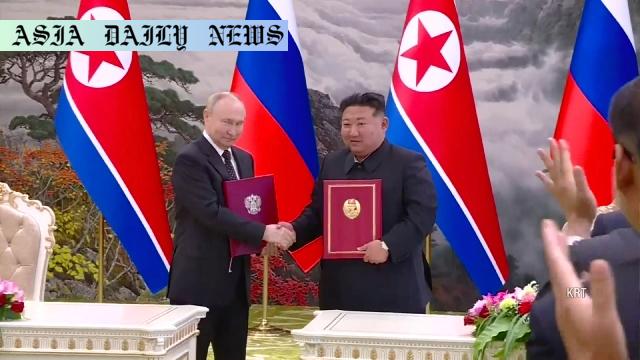North Korea aids Russia in joint operation, showcasing solidarity and strategic partnership amid Ukraine conflict.

North Korea’s Role in the Ukraine Conflict
In a surprising development, North Korea has extended its support to Russia by sending troops to aid Moscow in its ongoing conflict with Ukraine. This move marks a significant milestone in the budding partnership between the two nations, which is founded on mutual understanding and a treaty of comprehensive strategic partnership established in June 2023. The soldiers from North Korea’s special forces were instrumental in a joint operation aimed at driving Ukrainian forces out of Russia’s Kursk region, showcasing their strategic prowess and unwavering solidarity.
This collaboration is not only a reflection of military strength but also a demonstration of the deeply rooted camaraderie and shared geopolitical objectives between the two countries. By participating in this operation, North Korea has demonstrated its willingness to step onto the global stage, aligning itself more closely with Russia amidst escalating tensions in Eastern Europe. The deployment of troops highlights the intensity of this newly formed alliance.
Putin’s Acknowledgment Signals Growing Ties
Russian President Vladimir Putin publicly acknowledged North Korea’s contributions and expressed his gratitude in a statement released on Monday. Addressing the global community and his domestic audience, Putin emphasized the crucial role played by the Korean forces. He celebrated their efforts as acts of solidarity born of a sense of justice, highlighting the camaraderie that exists between Russia and North Korea.
Putin’s words emphasized the importance of the Treaty on Comprehensive Strategic Partnership signed between Moscow and Pyongyang. This treaty has evidently served as a cornerstone for mutual cooperation. By labeling the North Korean troops as “comrades” and thanking Leader Kim Jong Un earnestly, Putin underlined the political and emotional significance of this bilateral collaboration. The attribution of high regard to North Korea by Russia’s leadership symbolizes a shift in international alliances and the potential rebalancing of global powers.
The Implication for Geopolitical Dynamics
This military partnership between North Korea and Russia could send ripples across the global political landscape. Where North Korea has been largely criticized and isolated in the international community, this move repositions the nation as a strategic ally of a major global power. For Russia, the collaboration projects strength and solidarity amidst increasing international sanctions and diplomatic challenges from Western alliances over their actions in Ukraine.
The global reaction to this development remains to be seen, especially from the United Nations and NATO. Questions regarding the legitimacy of North Korea’s involvement and the future ramifications for international relations loom large. Nevertheless, the alliance formed under the guise of “solidarity” indicates a pivot for both nations, potentially reshaping alliances and friendships in other regions affected by this collaboration.
As this relationship develops further, economic, strategic, and political implications for both nations and the global community will continue to unfold. North Korea’s proactive role in supporting Russia undeniably strengthens its claims of being a capable power, reemphasizing the need for closer monitoring of these evolving dynamics.
Commentary
North Korea and Russia’s Growing Alliance
The decision by North Korea to send troops to support Russia stands as a remarkable demonstration of solidarity, especially amidst such a contentious global conflict. By aligning themselves with Russia during a time of heightened tension with Ukraine and the West, North Korea has solidified its position as more than just a regional player. This act showcases the nation’s larger ambitions of fostering global collaboration with powerful allies, while simultaneously resisting international isolation.
For Russia, North Korea’s assistance comes as a signal of its resilience and capability to build strong alliances despite challenges on the international stage. The acknowledgment and praise lavished by President Vladimir Putin underscore the significance of this partnership, especially given the rising hostilities between Russia and NATO. However, the global criticisms that may arise from such a collaboration should not be overlooked either.
A Recalibration of Global Alliances?
What stands out most about this development is its potential to alter the existing geopolitical frameworks. The alliance between North Korea and Russia goes beyond military cooperation; it represents a shared ideological resistance to what these nations may perceive as Western dominance in global politics. By coming to Russia’s aid, North Korea has reinforced its loyalty as a dependable partner, a message not only aimed at the West but at other nations who face similar animosity.
This gesture solidifies North Korea’s intention to position itself as a reliable ally to nations that face international sanctions or diplomatic challenges. Such a move may inspire other isolated or struggling countries to consider similar strategic alliances, reshaping the global order in unexpected ways.
Challenges Ahead
Despite the positivity surrounding this growing partnership, challenges remain. For North Korea, involvement in military operations outside its borders might provoke criticism or even sanctions from the international community. For Russia, the association with North Korea risks amplifying accusations of human rights abuses and international law violations by aligning with a nation that has long been a subject of global criticism.
Such challenges highlight the careful balancing act both countries must perform in the face of intensifying scrutiny. While the immediate effects of their alliance seem beneficial to the participants, its longer consequences will likely influence international relations across the board. Nevertheless, this action signals the start of a new era for both nations, one where mutual loyalty may redefine their respective positions in the global power hierarchy.


